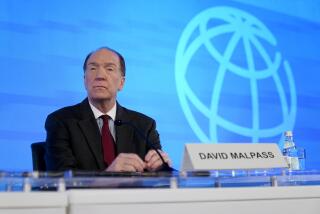IMF Leadership in Doubt as German Bid Nears Collapse
- Share via
WASHINGTON — A bid by Germany to name the next leader of the International Monetary Fund was on the verge of collapse Thursday, shrouding the leadership of the global lender in doubt.
In an informal poll of the IMF’s 24 board members Thursday, more than one-third abstained, reflecting the deep controversy surrounding the bid of German Deputy Finance Minister Caio Koch-Weser to succeed Michel Camdessus as head of the powerful, Washington-based lender that is known for its economic bailouts and austere policy demands.
Stanley Fischer, the fund’s acting managing director, came in second to Koch-Weser, followed by Eisuke Sakakibara, a former official in Japan’s Finance Ministry known as “Mr. Yen,” according to an IMF statement.
But the indecisive results underscored more than the rocky politics of the global economy. They also reflect the fact that critics are demanding broad reforms of the IMF in the wake of the Asian financial crisis.
Germany has invested considerable national prestige in pushing the candidacy of Koch-Weser, 55, its chief deputy finance minister, and pushing its somewhat reluctant European neighbors into line. But U.S. officials argued that Koch-Weser lacked the needed stature for the demanding job and last week made its opposition official, bruising German egos in the process.
On Monday, after the European Union formally endorsed the German candidate, the White House went public with its opposition, antagonizing EU officials.
For all that, however, “It’s clear that nobody can be named against the wishes of the United States any more than they could against [those] of the Europeans,” European Commission President Romano Prodi said in an interview to appear in Friday’s edition of the Financial Times.
Traditionally, the prestigious job goes to a European. U.S. officials insisted Thursday that they do not seek to end that practice and that their opposition to Koch-Weser is based on his lack of stature and leadership qualities, rather than any policy dispute.
“I want there to be a European [managing] director of the IMF,” President Clinton said Thursday, in conciliatory remarks to reporters. “I will not support an American candidate,” he added, alluding to Fischer, a naturalized American who enjoys the support of many emerging nations.
The messy episode was triggered by the retirement of the French Camdessus last month after 13 years in the top position. Although the IMF was widely criticized for its handling of the financial crises that engulfed large parts of Asia and other regions in 1997 and 1998, the job of running it remains among the most influential and prestigious in the financial world.
U.S. Treasury Secretary Lawrence Summers has proposed a series of reforms of the IMF that would require strong internal leadership. The proposals, which drew few complaints from European officials, include greater openness at the secretive institution, giving up some of its lending functions to the World Bank and the private sector, and improving its ability to respond to crises.
In congressional testimony earlier this week, Summers elaborated publicly on the U.S. doubts about Koch-Weser, without mentioning him by name. The IMF’s next leader must have “the requisite stature, the requisite expertise, the requisite ability to command global consensus and respect and the commitment to doing what needs to be done at the IMF,” Summers told the Senate Foreign Relations Committee.
The United States controls 17.35% of the votes in the IMF, followed by Japan and Germany, with 6.23% each, and Britain and France at 5.02% each.
More to Read
Sign up for Essential California
The most important California stories and recommendations in your inbox every morning.
You may occasionally receive promotional content from the Los Angeles Times.













